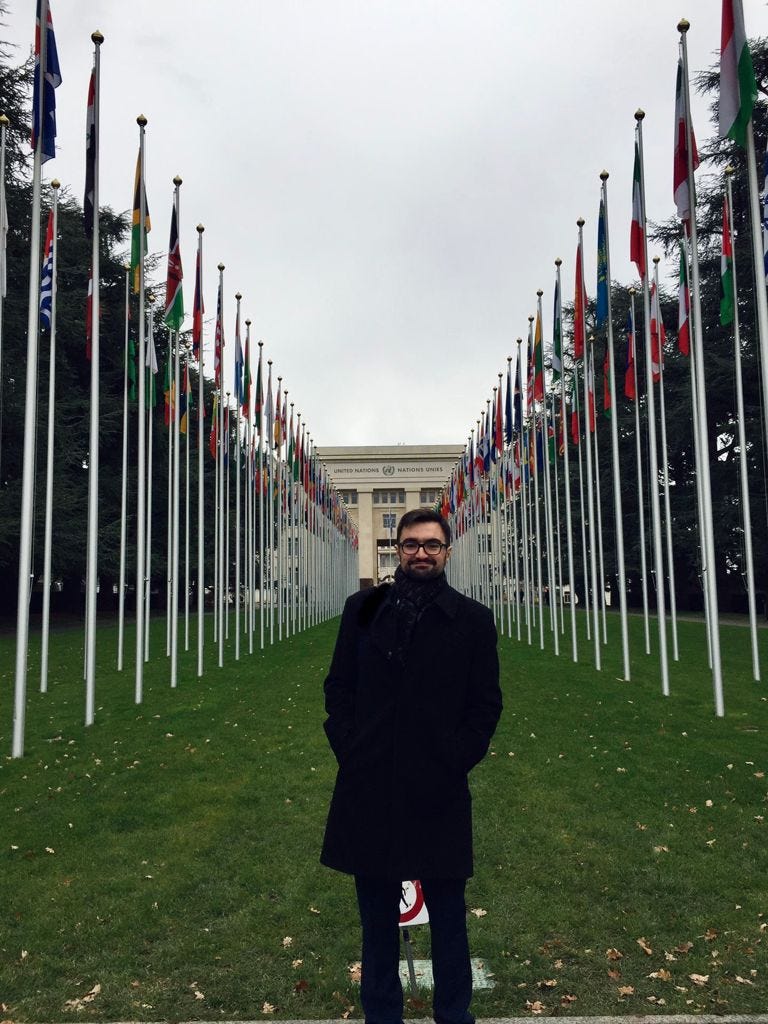I am pleased to bring you this interview with Ali Dinçer, who was a diplomat at the Turkish Foreign Ministry and one of hundreds of diplomats removed from the foreign service by Erdogan’s government in the aftermath of the failed coup in July 2016. Dinçer now lives in Belgium as a refugee and works at Solidarity with OTHERS, a Brussels-based human rights organization established to raise awareness about widespread human rights violations in Turkey. This interview, conducted on July 1, 2021, was edited for clarity and flow.

Ruth Ben-Ghiat (RBG): How does Erdogan fit in in the panorama of autocrats? At times his rhetoric about wanting to be the next leader of the Muslim world reminds me of Muammar Gaddafi.
Ali Dinçer (AD): I don’t think that Erdogan is completely unhinged or out of touch with reality in the sense that Gaddafi was. When we talk about autocrats, we tend to think of them as completely out of their minds, maybe because figures like Adolf Hitler doubled down in the face of adversity and made crazy moves that amplified their problems. But I think Erdogan is much more rational than that.
Erdogan likes to push the envelope to see how far he can go. But on multiple occasions, he has backed down in the face of serious backlash, either from the United States or from Europeans and even from Russia. I think he knows where to stop, as long as he knows where the red lines are. The problem is that oftentimes the other actors in international relations, democracies in particular, are not willing to go that extra mile to actually draw those red lines.
And this is what gives autocrats like Erdogan their room for maneuver. Erdogan operates in the vacuum between the loopholes of the international system and the inherent self-restraint of democracies, such as those in the EU, which gives him the impression that Europeans or Washington DC will not take action.
RBG: People always wonder why autocrats are popular with their people. What is Erdogan’s appeal for his supporters? I mean, he does the usual autocrat things. He talks about reviving the Ottoman empire. He builds airports. And so on.
AD: Nationalism is a founding identity sense in Turkey in the way that that freedom is a founding value for the United States. It’s something that most of the time Turks from across party lines agree on, like not recognizing the Armenian genocide. This chauvinism and the heated rhetoric that comes with it is something that is shared among like 90% of Turks, whether they are secular or religious. Erdogan sometimes makes use of that. He likes to talk about the times when women with headscarves were not allowed to enroll in universities.
He also reminds people of what a mess the country was when it was run by coalitions. It’s factually correct, because during the coalition era there was much turbulence, both in terms of the economy and politics. I remember the economic crisis of 2001, people went bankrupt all around us and Erdogan did bring greater stability.
But during that time of coalitions we enjoyed maybe not a perfect liberal democracy, but a relative sense of freedom because power was not centralized. I remember people being able to publicly criticize leaders, including the prime minister, and magazines were able to publish political cartoons. And when you were the victim of an injustice, you could hope to get justice from the courts or other institutions, which were at least partially functional.
Now there’s this new generation who will be eligible to vote in the coming elections. And they have never seen anyone in power other than Erdogan. And I think with them he’s incrementally losing that appeal, polls suggest they are less likely to vote for him, because his message about the chaos of coalition government and him providing stability does not work with them, they do not remember that time. These young people are also very active on social media and they can easily compare their standard of living with their peers in Europe.
RBG: You worked in the foreign ministry as a diplomat, and you lived through Erdogan’s purge of the civil service after the July 2016 coup attempt.
AD: I was at the Ministry of Foreign Affairs between 2014 and 2016, until the coup attempt [against Erdogan] in July 2016. And I was one of the first people to get fired, that same month. Most of the people who got purged after the coup were junior diplomats like myself, there were about 2000 career diplomats and when I left the number of total dismissals were at something like 500. The older establishment is still there but they don’t speak up, because only loyalty is rewarded.
Traditionally, the foreign ministry enjoyed independence. But as Turkey drifted toward towards authoritarianism, foreign policy became an appendage of domestic rhetoric. With the erosion of institutional independence there is a degeneration of people who used to be professional diplomats and cared about their jobs – now they have changed.
RBG: Can you tell me what it has been like to go into exile?
AD: There’s [anti-Erdogan] activism among exiles, mostly on social media, and there’s also a disillusionment with European politics, because human rights seem to be taking a backseat to other considerations where Europe’s relations with Turkey are concerned. Turkey is not a member of the EU, but it’s part of Europe’s customs union. A lot of European corporations have significant investments in Turkey and because of the cheap labor, they manufacture there and sell to the European market. To some extent they become lobbyists on behalf of the Turkish government, so that any reaction against Turkey usually gets killed at the European level.
I work in a human rights NGO based in Brussels, founded by former lawyers and jurists, exiles like myself. We publish reports on the human rights situation in Turkey. and we lobby European institutions, like the European parliament and especially the subcommittee on human rights. People often know what’s going on in China or Belarus or with the imprisonment of Navalny in Russia. But what’s going on in Turkey can go unnoticed so people are trying to bring awareness.
As for going into exile, when you get purged from public service your passport is immediately canceled. So you have to get out of the country in an irregular way. The traditional route has been Greece, but these days there’s a problem at the border with Greek border forces because of people coming from other countries and using Turkey as a transit space to enter Greece. Most people who are pushed back can stay in Turkey and try again. But when political exiles, people who need to flee, get pushed back, they are arrested.
Those who can make it are usually granted asylum in the countries of destination. And they have a chance to start over, but for many it’s not a very easy life. If you have some English you have a head start, but in continental Europe, you often have to learn local languages and start an integration process that is somewhat demanding. But people often don’t complain because given what’s going on inside Turkey right now, and given what happens to people who haven’t been able to leave the country, you usually don’t want to compare your situation.
By: Ruth Ben-Ghiat
Source: Lucid



